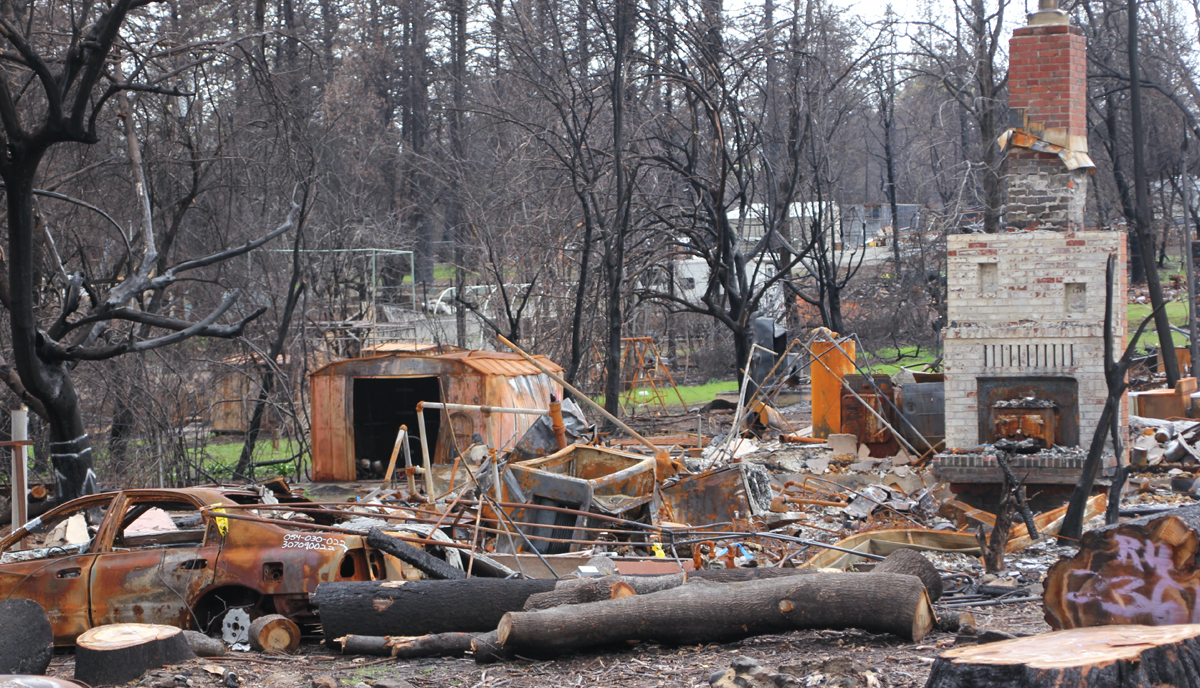(Time is running out to get my new course, Automating Your Real Estate Investments with the special bonuses. Don’t miss out.)
Many friends, relatives, and readers have contacted me to see if we are alright as the wildfires rage all around us here in Southern Oregon. I thought I would take a moment to let you all know the situation here at my house. We are surrounded by fires and covered with smoke but safe at this time.
There are three major fires burning around us as I write this. To the SW of us is a 131,000 acre forest fire headed towards us that is currently about 30 miles away and totally out of control. The roads out of our valley are closed in that direction.
To the SE, about 30 miles away, is another wildfire, about 3,200 acres in size, which burned rapidly through two small towns, basically wiping them off the map in less than 24 hours. 600+ homes and 100+ businesses were destroyed in that fire. It was halted right at the outskirts of the town my parents live in. At one point there were flames about 1.5 miles from their house. The road out of the valley was closed for a short time in that direction.
To the NE is a third fire that has exceeded 32,000 acres and threatens three towns that have been evacuated. The roads in that direction are also closed due to this out of control fire. That leaves only one good road out of our valley to evacuate if any of the fires reach us.
One bright point in all of this is the change in the local news on TV. Now we only hear about the fires, evacuations, and the weather. The pandemic, the riots, the presidential election, and whether or not the NFL will play this season have disappeared from the news reports. There is a silver lining in all this smoke.
The fires around us have made the air very unhealthy due to the massive amount of smoke they have produced. The air quality index which measures the amount of pollution in the air has risen to its highest ranking. Anything over 300 is considered hazardous to everyone’s health, not just those with respiratory conditions. As a reference, Los Angeles, which has the worst air quality in the US tends to have an air quality index of about 60-70. The air quality index in Southern Oregon is running between 300-600 each day. I have seen 999 listed in some cities in the last few days, which is the highest they can report.
When the air quality is that bad, it is hard to breathe and your eyes burn when you go outside. The masks used to prevent the spread of COVID-19 do nothing for the prevention of smoke inhalation. That requires a properly fitted N95 mask. Fortunately, I have two of these masks that I use for indoor spray painting. When using these masks, it feels like you are breathing very fresh air. I wear this mask when I leave the house now. But we pretty much stay indoors with the air quality so bad.
We were scheduled to drive to a timeshare for a vacation this week, but since only one of the five roads we could use to drive to the timeshare is open, and the air quality index is worse at our vacation destination than at home, and we would have to stay indoors anyway, there was no point in going, so we canceled the trip at the last minute.
What caused this once in a lifetime forest fire event? It was multi factorial. Forest fires have been happening every year since records were being kept. Each lightning storm that passes through starts fires. So why was this year so bad?
A: We are in the middle of a drought and the forests are very dry. Some argue this is from climate change. I don’t know if that is true as we have had droughts on and off throughout all of history.
B: “Environmental” groups shut down a lot of the logging in Oregon, so no one is caring for our forests any longer, which creates an accumulation of combustible brush.
C: “Environmental” groups have caused the removal of forest roads that allow fire fighters to get to the fires. Now the access to the forest is compromised.
D: Forest management has shifted to a “let it burn so nature can take care of itself” attitude. Which doesn’t seem to be working out so well.
E: A severe wind storm hit the area. This caused two problems. First, it fanned the flames of both old and new fires pushing them out of control. Second, with the wind and so many fires, the uniform smoke blanket has grounded the aircraft that are used to fight forest fires. The wind pushed the fires so fast in one instance that it swept through two towns in just a few hours. There is no way to fight a fire that is moving that quickly. It was all hands on deck to get people evacuated.
F: With so many fires at the same time, there are not enough firefighters or aircraft to go around. When a new fire gets started, there is no one to put it out.
These are a few lessons that I learned this week:

1: What is usually reported in the news is often not nearly as important as they make it out to be.
2: Tragedy can strike at any time. People in the nearby towns that were wiped out got only a moment’s notice to evacuate when the fire came so rapidly into town. Many left with only the clothes on their backs and the car they drove away in. They now have a pile of ashes that once was their home and everything they owned.
3: When you are told to be ready to evacuate, load your car immediately and leave. Don’t wait for the actual “leave now” order. Some evacuation routes were limited and blocked by fire. Evacuations also cause traffic jams, trouble getting gas for your car, and a shortage of places to stay. Get out early and avoid the congestion.
4: Think about how to be prepared for an evacuation before it happens. What will you grab if you have to leave quickly? Be sure you take passwords for everything you have “protected” online.
5: Make a video of every room in your house highlighting model numbers of expensive items in case you have to deal with a loss of property. This will give the insurance company an accurate record of everything that was lost. Your cell phone camera can be used for this recording.
6: Possessing a true emergency fund is extremely important. Those who depend on their credit card for their emergency fund may have a very difficult time repaying. Many people who are now at shelters have nothing. They must restart their life with the cash they have saved. Restarting by using debt makes a bad situation even worse.
7: Passive income is very helpful in a financial emergency. When a town burns up, often so does your job. One hundred businesses were destroyed in just one of these fires. Everyone who worked at those businesses is now without a job. An additional source of income would give them some stability while rebuilding their lives. But there are some investors whose passive income was a rental unit that went up in flames. I hope their insurance will cover their loss.
8: Always have a few Fitted N95 masks on hand. You never know when they will come in handy. This is the third time we have had to use them due to forest fires causing hazardous air quality since we have lived in Southern Oregon.
9: Remember what is truly important in life. Family and friends trump stuff any day. The stuff that can burn up can also be replace. Cherish and nurture your relationships.
If you find yourself in the midst of a disaster, my newest book was written to help you get through it. The Doctors Guide to Navigating a Financial Crisis will give you tools and ideas to help get your life back on track. My hope is that you will never need the information in this book, but if you do, it will guide you through your tragedy and equip you to be prepared for the next.
Sadly, many people face a disaster every day. Fires, hurricanes, tornados, cancer, earthquakes, floods, and job loss are continually happening somewhere in our world and each one brings along with it a personal financial crisis. We are all only a moment away from some sort of disaster.
I hope this article encourages you to get prepared before disaster strikes. Stay safe.




